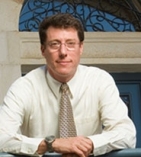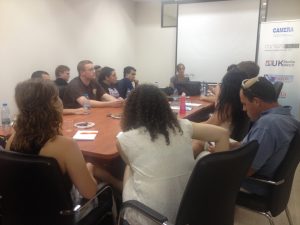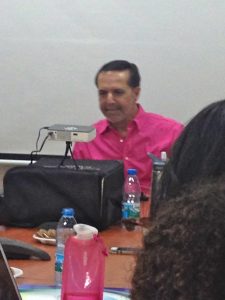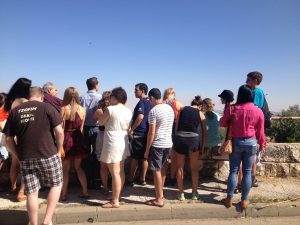This past week, CAMERA students from around the United States, Canada and Uruguay gathered for CAMERA’s annual Student Leadership and Advocacy Training Mission in Israel. The trip’s goal is to teach students to accurately and affectively spread their messages about Israel. The students on the trip include CCAP activists, CAMERA Fellows, and Israel campus leaders. The speakers with whom they met discussed their perspectives on the Israeli-Palestinian Conflict and brought new ideas up for discussion.


On the first day, students met with Daniel Gordis, the Senior Vice President and a Senior Fellow at the Shalem Center. Shalem College was the first liberal arts college in Israel. Shalem College works with American universities, including Columbia University, in order to learn more about the American-style core curriculum.
Gordis spoke about how the students could most effectively make a case for Israel. In the beginning of his speech, he acknowledged the changing relationship between the United States and Israel. In particular, he discussed the US government’s reluctance to condemn the kidnappings of the three yeshiva boys. Gordis also touched on America’s, as well as the rest of the world’s, diminishing Jewry. Gordis then stressed that a good case for Israel should be built on neither a good case against those who are anti-Israel nor a case about the Holocaust. Gordis asserted that a good case for Israel has to include the fact that the Jewish people has come home. He believes that the Jews have come home to heal. This means that, according to Gordis, the case for Israel has to start much earlier than Theodor Herzl’s Zioinist dream.
Gordis then moved on to a discussion about cultures and the West’s need to accept all civilizations without any scrutiny. Gordis focused on the West’s inability to criticize the violence of Islamic culture. He then went on to discuss the West’s desire to be and identify with the underdog and its affect on the growth of groups like JStreet or anti-Israel causes.

After Gordis, the students met with Tamar Sternthal, the director of CAMERA’s Israel office. Sternthal gave a thorough history of CAMERA’s establishment and its mission. She also gave an analysis of two different newspapers that CAMERA contacts frequently, Ha’aretz and the New York Times. Sternthal said that Ha’aretz’s problem was mainly in their translations. In Hebrew the articles were fine, but in the English translation they would have a completely different bend, whereas the New York Times’ problems stemmed from its inability to treat Israel fairly and their inaccurate statements.

Then the students met with Khaled Abu Toameh, an Arab-Israeli journalist who used to work for a publication by the Palestinian Liberation Organization (PLO). He said that most of his time at the PLO publication was spent waiting for the PLO instructions on what to write. He now writes for the Jerusalem Post and has the freedom to choose his topics. During his presentation he discussed how his background allowed him to do interviews with Palestinians and have insight into their culture. Additionally, he was actually able to predict Arafat’s radicalization, but the US dismissed him as a pessimist. He also discussed the Palestinian views of Israel. He explained that there are two schools of thought; those that want the 1948 boarders and those who want the 1967 boarders. Finally, Toameh said that the biggest problems are that the Palestinians don’t believe in Israel’s right to exist and that they are radicalizing.

To finish their first day, the students went on a tour of Jerusalem with Israel Kimhi, an urban planner in Jerusalem. Kimhi has been involved with peace talks and is an expert on Jerusalem. He began his presentation with a PowerPoint full of information about Jerusalem’s changing geography and its demographics. This survey included the ratios of Arabs to Jews as well as the employment ratios within those groups. Kimhi gave an in depth history of Jerusalem and took the group to the edge of Bethlehem. His tour took the students to places where they could look over into the West Bank and East Jerusalem. Kimhi did touch on the issue of the security fence. He claimed that while not many Israelis like the fence, that it works for now.
The first day of the CAMERA trip gave the students a good foundation for what would follow. Hearing from a diverse group of speakers gave the students new ways to think about issues that they talk and think about on a daily basis.
Contributed by Rachel Wolf – CAMERA Intern through Onward Israel.

